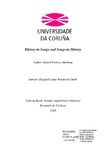Mostrar o rexistro simple do ítem
History in Songs and Songs in History
| dc.contributor.advisor | Woodward Smith, Elizabeth | |
| dc.contributor.author | Fonseca Martínez, Daniel | |
| dc.contributor.other | Universidade da Coruña. Facultade de Filoloxía | es_ES |
| dc.date.accessioned | 2021-03-08T10:13:55Z | |
| dc.date.available | 2021-03-08T10:13:55Z | |
| dc.date.issued | 2020 | |
| dc.identifier.uri | http://hdl.handle.net/2183/27431 | |
| dc.description.abstract | [Abstract] Through music Ireland expresses its culture like no other nation in the world. Important events and the people involved in them are recorded in music to preserve them in people´s memory. Ireland has a long history of conflict between the the Irish and the British and music, as an expression of culture, provides so much information about the different ideologies. The objective of this work is to explore the connection that exists between music and history in the isle of Ireland. The first part of the work focuses on different types of songs and styles that are used to express certain ideas and ideologies like rebel songs or emigration songs. This part helps to classify some of the songs that are presented in the work. After this, a few events and some of the protagonists that were involved are analysed from a historical perspective in order to see how they are represented in music. The events analysed have a relevant role in Irish history. Namely, they are the Great Famine, the emigration, the Easter Rising, the Irish War of Independence and the Irish Civil War. In the third part of the work I focus on three Irish songs and analyse their backgrounds and story as a way to show these songs in their historical and cultural context and see how they became so important. The analysis of the songs is carried out using with a bibliography that deals, mainly, with history and Irish music separately. However, some sources about music and history together are used too. As a result, music proved to be a good mechanism to explore history from a different perspective to the narrative that can be found in classic history books. The relationship between music and history works in both ways, since one part gives depth to the other. Finally, in Ireland, music has a great symbolical power and the use of language, for instance, can produce political reactions, as can be seen with the Irish Anthem. | es_ES |
| dc.language.iso | eng | es_ES |
| dc.rights | Os titulares dos dereitos de propiedade intelectual autorizan a visualización do contido deste traballo a través de Internet, así como a súa reproducción, gravación en soporte informático ou impresión para o seu uso privado e/ou con fins de estudo e de investigación. En nengún caso se permite o uso lucrativo deste documento. Estos dereitos afectan tanto ó resumo do traballo como o seu contido Los titulares de los derechos de propiedad intelectual autorizan la visualización del contenido de este trabajo a través de Internet, así como su repoducción, grabación en soporte informático o impresión para su uso privado o con fines de investigación. En ningún caso se permite el uso lucrativo de este documento. Estos derechos afectan tanto al resumen del trabajo como a su contenido | es_ES |
| dc.subject | The Irish and the British | es_ES |
| dc.subject | Music and History | es_ES |
| dc.subject | Ideologies | es_ES |
| dc.subject | Songs | es_ES |
| dc.title | History in Songs and Songs in History | es_ES |
| dc.type | info:eu-repo/semantics/bachelorThesis | es_ES |
| dc.rights.access | info:eu-repo/semantics/openAccess | es_ES |
| dc.description.traballos | Traballo fin de grao (UDC.FIL). Inglés: estudios lingüísticos y literarios. Curso 2019/2020 | es_ES |






